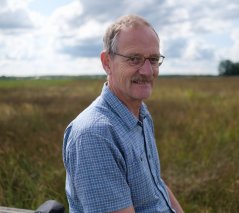
News
‘We need different types of agriculture and nature’
The scale of the challenges that humanity faces in the coming decades is daunting, says Ken Giller, professor in Plant Production Systems at WUR. ‘We want to ensure stable and nutritious food for the burgeoning global population which will reach at least 10 billion, while setting aside a third of the planet for nature and biodiversity and combatting global heating. The land sharing/land sparing debate is at the centre of these discussions – should we intensify production on small areas of land and leave land aside for nature? Or should we practice a less-intensive, nature-inclusive form of farming?’
The environmental conditions should determine whether you farm intensive or extensive.
He argues there is no simple choice for one or the other – it’s not black or white, but many shades of green. ‘We live at a time when populist politics prevails, focused on short-term political and economic gains. Increasingly scientists fall into the ‘populist trap’ – of having to choose between organic and conventional, between ‘alternative’ agricultures juxtaposed against large-scale industrial, conventional agriculture. But conventional agriculture comes in a myriad of different forms locally adapted to conditions and production systems around the world - almost all farms in the world are ‘conventional’ family farms! So we need both options. The environmental and socioeconomic conditions should determine whether you farm intensively or extensively.’
About Ken Giller
Ken Giller is an outstanding expert in the field of plant production systems. He leads a group of scientists with profound experience in farming systems analysis to explore future scenario’s for land use with a focus on food production. His research has focussed on smallholder farming systems in tropical regions. In particular problems with soil fertility, nitrogen fixation in legumes and the spatial dynamics of resources have his interest.
He initiated a number of large research programmes, such as N2Africa, a programme donated by the Bill and Melinda Gates Foundation that put nitrogen fixation to work at 660.000 smallholder farmers in Africa. He also initiated large research programmes on Nutrient Use in Animal and Cropping Systems: Efficiencies and Scales (NUANCES) and Competing Claims on Natural Resources. He is the promotor of more than 100 PhD students.
- Unfortunately, your cookie settings do not allow videos to be displayed. - check your settings
Land sharing or land sparing
Giller will give a key speech at the opening of the academic year of WUR about ‘land sparing or land sharing’: should we separate or integrate food production and biodiversity conservation?
He and his colleagues did research on cocoa production in Cameroon, where farmers produced low yields of cocoa per hectare planted into a gallery forest with a lot of biodiversity. Nearby, other farmers gained much higher yields on sunny cacao plantations with little biodiversity. ‘Both farming systems have pro’s and con’s. The key question is: what type of agriculture and nature do we want? To answer this question we also need to bear in mind that some crops, like cocoa, are easier to combine with nature conservation and others are not.’

Giller has spent decades researching small-scale low-productive agriculture in Africa. ‘The food needs of the rapidly growing population have been met by massive expansion of the area under agriculture and food imports. It could be argued that the lack of nitrogen in African agriculture has driven land use change and the loss of biodiversity. Poorly productive agriculture leads to soil degradation, provides only ecosystem dis-services and is of no benefit to anyone.’
By contrast, the balance in Europe has been tipped to the other side. ‘While productivity in Europe has increased – along with increasing intensity of inputs creating issues such as the nitrogen crisis in the Netherlands – the area of land under agriculture has reduced and continues to fall – creating problems of rural de-population.
Economic systems
The economic systems with low margins forces farmers in the direction of higher yields and larger farms, with negative impacts on nature exemplified by the nitrogen crisis’, says Giller. ‘African farmers are victim of the same economic drivers, because they lack the resources or any support to boost production. For that reason, we need more thoughtful government engagement both in Europe and Africa.’
This doesn’t mean that intensively cultivated cash crops are always bad for biodiversity, adds Giller. He explains that Zimbabwe used to have a lucrative cotton production sector which gave farmers the opportunity to earn a living from a small area of land. When the production of this cash crop collapsed during the economic crisis, the unemployed workers switched to keeping livestock. As a result, a lot of the habitat for the African wildlife outside the nature reserves was lost. In this case, intensive production and the income generated eased the pressure on nature.’
Food systems are very complex and we need to accept that.
‘Food systems are very complex and we need to accept that. If we choose to integrate agriculture and nature conservation, we need to study the local and global consequences and trade-offs so that our societies can make informed decisions. There is no room for dogma in science.’
Mooi Binnenveld
In the past years, Giller was increasingly involved in nature conservation near Wageningen. He is a volunteer of the Mooi Binnenveld foundation, a societal initiative that has bought 50 hectares of agricultural land for nature restoration. Giller, who was trained as a botanist in England, is now helping with mapping the species richness in this reclaimed nature reserve. ‘It is great to see how quick the biodiversity of both flora and meadow birds has recovered in the past years.’ But also in this case, such developments may have unintended consequences. ‘When we reduce agricultural production in Europe and turn more land back to nature, we may end up exporting our ecological footprint to other countries causing expansion of agriculture and loss of forests. So we also need to consider reducing our own consumption at the same time.’